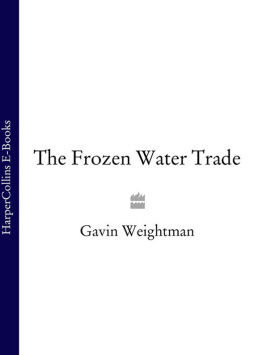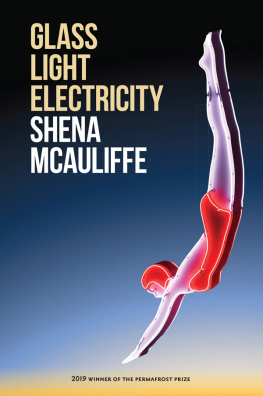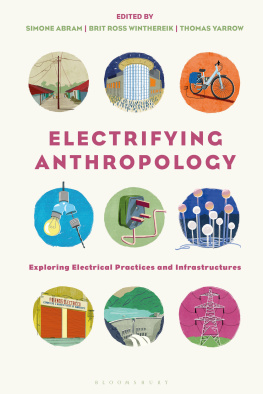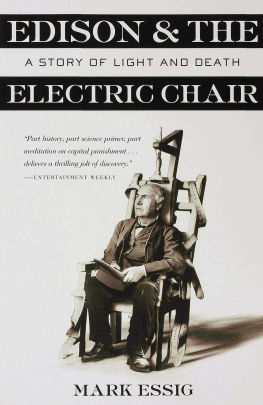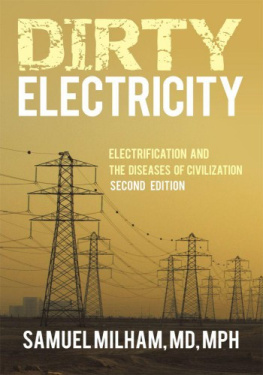CHILDREN OF LIGHT
Also by Gavin Weightman
The Industrial Revolutionaries
London River: A History of the Thames
The Frozen Water Trade
Signor Marconis Magic Box
CHILDREN OF LIGHT
HOW ELECTRICITY
CHANGED BRITAIN FOREVER
Gavin Weightman

First published in Great Britain in 2011 by Atlantic Books,
an imprint of Atlantic Books Ltd.
Copyright Gavin Weightman, 2011
The moral right of Gavin Weightman to be identified
as the author of this work has been asserted by him in accordance with
the Copyright, Designs and Patents Acts of 1988.
All rights reserved.
No part of this publication may be reproduced,
stored in a retrieval system, or transmitted in any form or by any means,
electronic, mechanical, photocopying, recording, or otherwise, without the
prior permission of both the copyright owner and the above
publisher of this book.
1 2 3 4 5 6 7 8 9
A CIP catalogue record for this book
is available from the British Library.
ISBN: 978 184887 225 7
eISBN: 978 0 85789 300 0
Printed in Great Britain
Atlantic Books
An imprint of Atlantic Books Ltd
Ormond House
2627 Boswell Street
London
WC1N 3JZ
www.atlantic-books.co.uk

ACKNOWLEDGEMENTS
In 1941, the historian Marc Bloch wrote: In reproaching traditional history, Paul Valry has cited the conquest of the earth by electricity, as an example of one of those notable phenomena which it neglects, despite the fact that they have more meaning and greater possibilities of shaping our immediate future than all the political events combined. The French philosopher Valry thought this inevitable, as there was not much material for the historian to explore. Bloch disagreed: surely there were copious company reports and specialist publications to be mined? The fault was not a lack of raw material but a lack of interest in technology among mainstream historians.
My experience in researching the history of electricity in Britain supports both views: there is precious little written in mainstream history on the subject, while there is a wealth of material on the rise of the industry in specialist libraries. The trouble is that the bulk of the historical material is dry and technical and lacks human interest. Some of the early memoirs are fun, but the later ones are dull as ditchwater, managerial rather than adventurous. I am therefore especially grateful to a small number of specialists who have helped me put narrative meat on the bare bones of the technical literature.
First, Dr Brian Bowers, formerly of the Science Museum, and author of many of the most authoritative and accessible books on the history of electricity and lighting, has been a very helpful guide to the available historical material. Professor John Wilson of Liverpool University, the biographer of Sebastian Ferranti, was very generous with his time in answering my questions about the life of one of the giants of electrical history. Mike Hearn was very helpful in sorting out some technical issues and was a mine of information on early electricity schemes. Peter Lamb and Andrew Smith of the South Western Electricity Historical Society shared memories of the days of the nationalized industry and gave me some valuable information on early schemes.
Asha Marvin and Sarah Hale, archivists at the IEE Library in Savoy Place, provided me with much detailed information on the Electrical Association for Women, as well as on many social aspects of the impact of electricity. All the staff of the IEE Library assisted in unearthing files from the depths of the storage system, including an official account of the impact of the Blitz on electricity supplies. At the London Transport Museum, Caroline Brick provided information on the speed limits of electric tramways, and Dick Swann of the Newcomen Society provided me with an account of an early electrical installation in London.
I had a great deal of assistance from local libraries in my research into the early days of electricity supply. Thanks to the staff of Godalming Museum, who made me welcome and provided me with a number of valuable files. Also to Lynn Humphries at Sheffield Local Studies Library, who sent me newspaper articles and other material about the worlds first floodlit football match, played at Bramall Lane in 1878. Tyne and Wear Archives Service provided copies of some rare documents, notably the memoirs of Henry Edmunds, who had so many adventures working with Joseph Swan. Thanks to them and to Andrew Frost of John Frost Newspapers, who produced a valuable file on the opening of the worlds first commercial power station at Calder Hall. I would like to thank Stuart Oliver of UK Coal for providing me with some valuable background on the recent history of the mines, and Isobel Rowley for introducing me to the workings of the National Grid. Dr Marjory Harper at the University of Aberdeen provided some useful references on hydro-electricity in the Highlands. Darwin Stapleton in America kindly forwarded some work he had undertaken on the electrical pioneer Charles F. Brush.
As always the staff of the London Library were extremely helpful. I would like to thank them as well as the staff of the British Library and Simon Blundell, Librarian of the Reform Club, for their help. Finally I am indebted to Angus MacKinnon at Atlantic for commissioning the book, to Annie Lee for her meticulous editing and to my agent Charles Walker and his assistant Katy Jones for looking after my interests, as always.
LIST OF ILLUSTRATIONS
INTRODUCTION

With a fanfare of trumpets, the Electrical Age has arrived. At least, the electrical advertisements say so. Great central generating stations have been built and equipped with expensive machinery; steel pylons have been erected all over the country to carry electrical energy to houses, factories and farms. Only one thing is lacking. There are not enough people who are willing to buy the electricity that is produced; and those who do buy it do not buy enough. This difficulty was not anticipated by the electricians. Yet if they are to justify the millions of money spent on the Electricity Grid they must induce more and more people to buy the electricity they make.
Those were the days. The quote is from a pamphlet published in 1934 with the intriguing title The Lure of the Grid, in which the author, Eileen Murphy, warns women not to be seduced by propaganda encouraging them to fill their homes with electric gadgets. It must not be thought that I am a rabid opponent of electricity, she assured her readers. On the contrary, I recognise that there are ways in which electricity is a vital part of modern life for instance, in the supply of power to workshops and factories and for decorative Neon lighting. On the other hand, I dislike any attempt to stampede the housewife by extravagant promises into buying electricity for household purposes in which it has not been proved to be either economical, healthy or efficient.
Now that Britain is thoroughly electrified, every quarterly bill arrives with advice on how to reduce our use of it. At some point in the history of the electrification of Britain the exhortation to use more of the stuff which so infuriated Mrs Murphy was turned on its head and we were instead asked to switch off and save wherever possible. This is symptomatic of the fact that there is something contrary in the nature of electricity which makes its history very difficult to grasp, and is perhaps the reason it barely gets a mention in most accounts of the creation of modern Britain. It is simply taken for granted, and the era, not so very long ago, when lighting a room with a flick of a switch was regarded as a great luxury is more or less forgotten. Indeed, the little filament light bulb, which first made this instant illumination possible in the early 1880s, is now to be banned because it is too power-hungry. Yet it was that invention on which the early electricity industry was founded.
Next page

